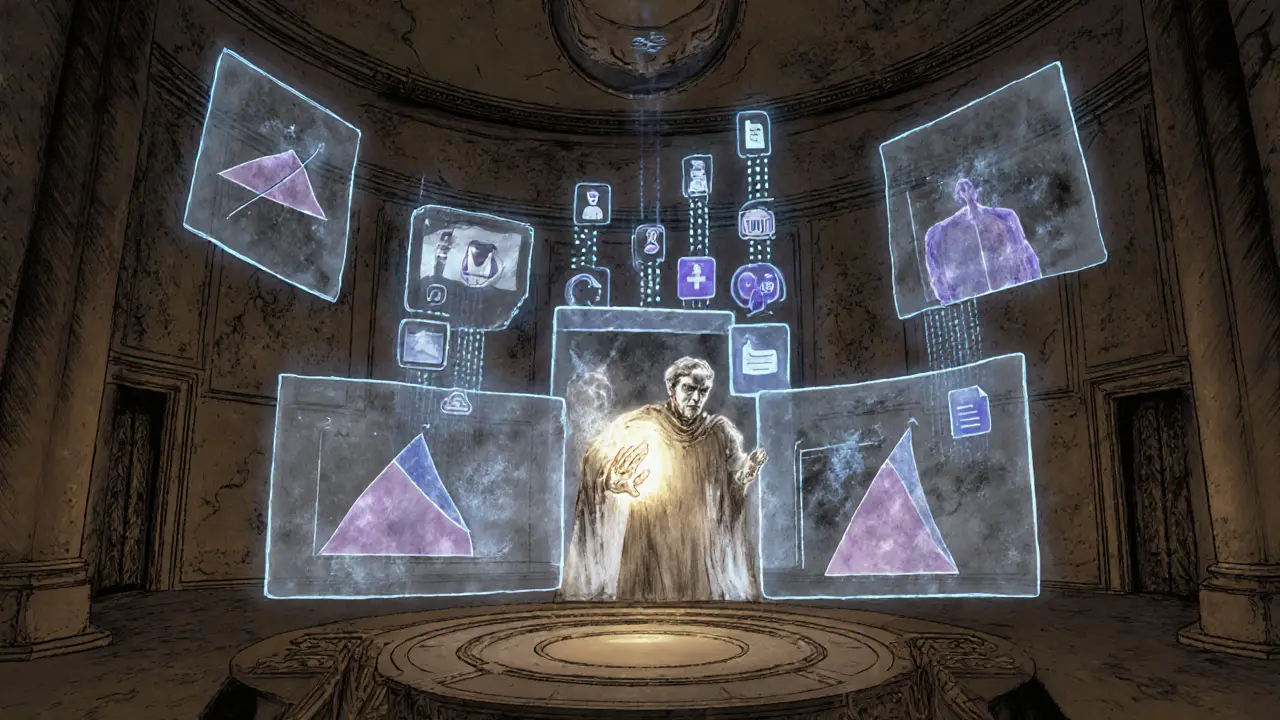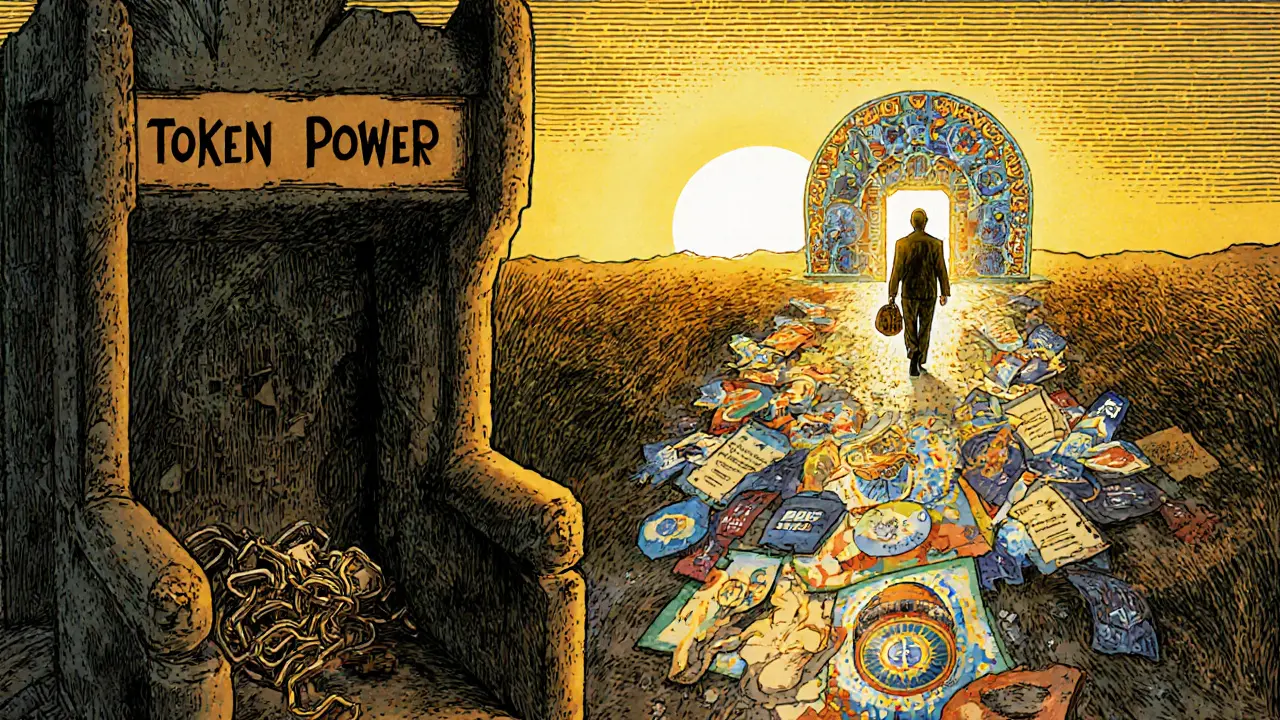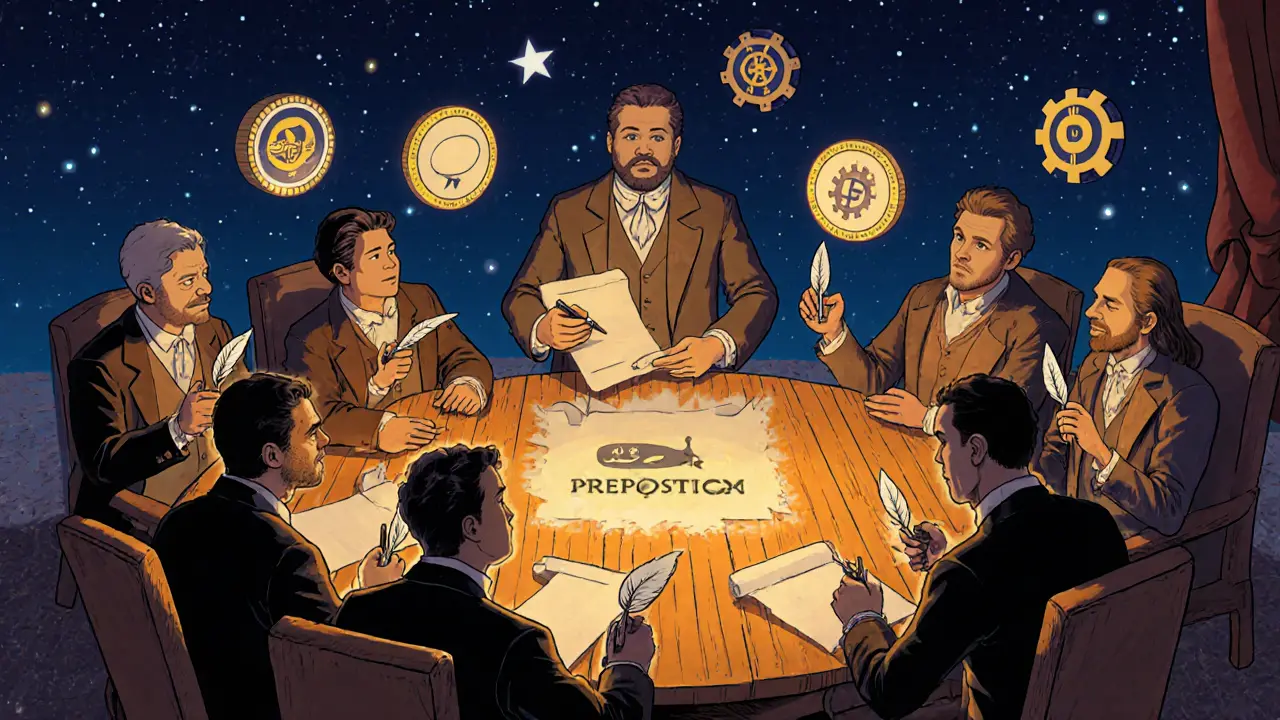DAO Governance Model Comparison Tool
Compare Governance Models
See how different DAO governance approaches compare across key metrics. Select the models you want to evaluate and discover which fits your community's needs.
Key Comparison Metrics
Fairness to Small Holders
How well the model protects against whale dominance and gives smaller participants influence
Voter Participation
How likely it is to engage a larger portion of the community in voting
Implementation Complexity
Difficulty to set up and maintain
Whale Resistance
How effectively the model prevents large token holders from dominating decisions
AI Integration
Ability to incorporate AI tools for governance assistance
Legal Compliance
Ease of meeting legal requirements
How Your DAO's Participation Could Improve
Results
By 2025, DAO governance isn’t just about voting with tokens anymore. It’s a living system adapting to real-world failures, user fatigue, and technological leaps. If you’ve ever felt overwhelmed trying to vote on 17 proposals in a week, or watched a whale push through a change you disagreed with, you’re not alone. The future of DAOs isn’t about more democracy-it’s about smarter democracy.
Token Voting Is Broken, But It’s Not Dead
Token-based voting still powers 58% of DAOs. But here’s the problem: owning 5% of the tokens can mean controlling 70% of the outcome. In 2024, ECGI Global found that 73% of contentious votes were decided by holders with over 30% of the supply. That’s not decentralization. That’s plutocracy with a blockchain logo.
Some DAOs tried to fix this by capping votes per wallet. Others banned whales outright. Neither worked. The real shift? Moving from token-weighted to vote-weighted systems. Quadratic voting is now used by 30% more DAOs than in 2023. In Gitcoin DAO, a member with 100 tokens can cast 10 votes-but each additional vote costs more. The 11th vote costs 121 tokens. The 20th? 400. That means small holders can still have influence without being drowned out.
It’s not perfect. It’s harder to understand. But users who’ve tried it say it feels fairer. One Reddit user wrote: “My 12 tokens used to mean nothing. Now I can make my voice heard.”
Reputation Is the New Token
What if your vote didn’t depend on how many tokens you bought-but on what you’ve actually done?
Reputation-based systems are now used by 29% of DAOs. Colony, one of the pioneers, tracks 27 different contributions: writing code, moderating forums, translating docs, organizing events. Your voting power grows with your activity, not your wallet size. In task-focused DAOs, reputation makes up 65% of your influence. Tokens? Just a ticket to join.
A CoinDesk survey of 1,200 DAO members found that 63% preferred reputation systems over pure token voting. One respondent said: “My expertise in smart contract security should count more than how many tokens I hold.” That’s the core idea now: governance should reflect contribution, not capital.
DAOs like Karma and Aragon have built tools that auto-track contributions across GitHub, Discord, and Notion. No manual reporting. Just proof of work, recorded on-chain.
A.I. Is the Silent Voter
Imagine a DAO where your proposal gets summarized in 30 seconds. Where AI flags risky treasury moves before they’re voted on. Where routine decisions-like rebalancing stablecoins or paying contractors-are handled automatically.
That’s not sci-fi. 43% of DAOs now use AI tools in governance, according to Gate.com’s 2025 analysis. AI doesn’t vote. It advises. It filters. It prepares.
Snapshot’s platform now uses AI to collapse 10-page proposals into bullet points. Developers report 47% faster voting cycles. MakerDAO, which used to get 17 proposals a week, now uses AI circuit breakers to auto-reject low-quality submissions. The AI doesn’t decide. But it saves humans from drowning in noise.
Some DAOs even have AI delegates. These aren’t bots replacing humans-they’re assistants handling predictable tasks: paying invoices, updating treasury allocations, sending reminders. Humans still vote on big changes: new hires, major grants, legal shifts. The AI handles the grind. That’s the real win.

Hybrid Models Are Winning
The most successful DAOs in 2025 don’t pick one model. They mix them.
Conviction voting lets you lock up tokens for longer to gain more voting power. The longer you stake, the more influence you get. It rewards patience, not speculation.
Liquid democracy lets you vote directly-or delegate your vote to someone you trust. If you’re busy, you can assign your vote to a core contributor who knows the space. In Karma DAO, 42% of members delegate at least some of their voting power.
Holographic consensus, from DAOstack, uses prediction markets to gauge interest before a vote even happens. If a proposal doesn’t get enough “confidence” from the community, it never goes to a vote. That cuts governance overhead by 38%.
These aren’t alternatives. They’re layers. Think of DAO governance like a Swiss Army knife: use the right tool for the job. Token voting for funding rounds. Reputation for technical decisions. Liquid democracy for community votes. AI for routine ops.
Legal Gray Areas Are Starting to Clear
For years, DAOs operated in legal limbo. Were they partnerships? Corporations? Unincorporated associations? No one knew.
That’s changing. As of January 2025, only 7 jurisdictions had clear DAO laws. Wyoming, Tennessee, and the Marshall Islands were early adopters. The EU’s 2025 Digital Governance Act gave DAOs provisional legal status-17 European DAOs have already registered under it.
But in the U.S., the SEC’s February 2025 enforcement action against “unregistered security offerings” sent shockwaves through 62% of American DAOs. If your governance token acts like a share, it might be treated like one.
Smart DAOs now build legal wrappers. They separate governance from treasury. They use LLC structures in Wyoming for compliance. They avoid offering financial returns in token terms. The goal? Not to be a corporation-but to be legally visible.

Voter Fatigue Is the Biggest Threat
Low participation isn’t a bug. It’s the default.
Across all DAOs, average voter turnout is just 17%. Even in top-tier DAOs, it rarely hits 30%. Why? Too many proposals. Too much jargon. Too little time.
DAOs that survive 2025 have one thing in common: they make voting easy.
Tally’s one-click interface cut onboarding time from 45 minutes to 8 minutes. Snapshot’s mobile app lets you vote from your phone. Aragon’s documentation got a 4.7/5 rating on GitHub because it actually explains how to vote.
Some DAOs now limit proposals to one per week. Others use “voting windows”-only open for 72 hours. Others auto-schedule votes for weekends, when people are less busy.
And then there’s rage-quit. Pioneered by MolochDAO, this lets members leave with their share if they disagree with a decision. It’s a safety valve. 61% of DAOs now have it. It doesn’t stop bad votes. But it stops bad communities.
What’s Next? The Symbiotic DAO
The future isn’t fully human. It’s not fully AI. It’s not fully decentralized. It’s something else.
MITosis University calls it the “symbiotic DAO.” A system where humans focus on strategy, AI handles execution, reputation rewards contribution, and quadratic voting prevents concentration of power.
DAOs managing over $22.3 billion in assets are already doing this. Gitcoin funds open-source devs. CityDAO owns land in Wyoming. PleasrDAO buys digital art. Enterprises like 34% of Fortune 500 companies are testing DAOs for project teams.
The goal isn’t to replace companies. It’s to build better ones. More transparent. More fair. More resilient.
By 2030, DAOs could manage over $1 trillion-if they solve three things: get 35%+ participation, get legal recognition, and stop letting whales run the show.
The tools are here. The models are proven. The question isn’t whether DAO governance will evolve. It’s whether you’ll be ready when it does.
What’s the biggest problem with current DAO governance?
The biggest problem is low participation and disproportionate influence by large token holders, often called "whales." Only about 17% of token holders vote on average, and 73% of contentious votes in 2024 were influenced by those holding over 30% of the supply. This undermines the goal of true decentralization.
How does quadratic voting fix whale dominance?
Quadratic voting makes each additional vote more expensive. The first vote costs 1 token, the second costs 4, the third costs 9, and so on (n²). This means a whale can’t buy 100 votes with 100 tokens-they’d need 10,000. It lets small holders express strong preferences without being drowned out, reducing whale influence by up to 22% in tested DAOs.
Are AI agents making decisions in DAOs?
No, AI isn’t voting. It’s assisting. AI tools summarize proposals, flag risky treasury moves, auto-pay contractors, and even suggest voting patterns based on past behavior. But final decisions on major changes-like funding or legal structure-are still made by humans. AI reduces noise, not agency.
Can I join a DAO without buying tokens?
Yes. Many DAOs now use reputation-based systems where you earn voting power by contributing-writing code, translating docs, moderating, or organizing events. Some even let you participate in discussions or testing without any tokens at all. Your value comes from what you do, not what you own.
What’s the easiest way to start participating in a DAO?
Start with Snapshot or Tally. Join a DAO’s Discord or Telegram. Read one proposal. Cast a vote on something simple, like choosing a logo or setting a meeting time. Most DAOs now have one-click voting and mobile apps. Onboarding takes less than 8 minutes. Don’t wait to be an expert-just show up.
Why do some DAOs fail?
Most fail because of vague decision-making, low participation, or lack of legal structure. ConstitutionDAO collapsed after winning an auction but couldn’t agree on what to do next. DAOs that survive have clear processes, tools for easy voting, and mechanisms like rage-quit to let people leave peacefully if they disagree.
Is DAO governance legal?
It depends on where you are. As of 2025, only seven jurisdictions have clear laws for DAOs: Wyoming, Tennessee, the Marshall Islands, and four others in Europe and Asia. The U.S. SEC has taken action against DAOs treating tokens like securities. Many DAOs now form legal entities in friendly jurisdictions to protect members.
How much does it cost to start a DAO?
You can create a basic DAO for under $500 using tools like Aragon or DAOstack. But a fully functional DAO with AI integration, cross-chain support, and legal structure can take 120+ hours of setup time and $10,000-$50,000 in development and legal fees. Most successful DAOs start small and scale.

Eli PINEDA
November 1, 2025 AT 21:54quadratic voting is kinda wild fr, i had 12 tokens and felt like a ghost now i can actually vote on stuff without feelin like i’m beggin for attention
Genevieve Rachal
November 2, 2025 AT 05:27Oh please. You think quadratic voting fixes anything? It just makes the math harder. The whales still own the liquidity pools, the infrastructure, and the dev teams. This is theater with a whitepaper. 🤡
Debby Ananda
November 4, 2025 AT 04:59AI is the silent voter?? 😏 I mean… if you say so. But let’s be real - the AI is just the new gatekeeper. Who trains it? Who owns the model? Who gets to say what’s ‘low quality’? 🤔
Vicki Fletcher
November 5, 2025 AT 11:07Wait, so… if I contribute, I get reputation… but what if I’m just a translator, or a moderator, or a community builder… and I don’t code? Do I still matter? Or is this just another way to reward the devs? I’m confused….
Mehak Sharma
November 5, 2025 AT 20:10DAOs are not about replacing corporations they are about rebuilding trust from the ground up with transparency and shared ownership. The tools exist now to make this real - but only if we stop treating governance like a stock market and start treating it like a community garden. Grow together or wither alone
Ron Cassel
November 7, 2025 AT 03:03They’re all controlled by the same VCs anyway. You think Gitcoin’s independent? Look at their funding rounds. The SEC’s just playing along until they can shut it all down. This is the last gasp of crypto libertarianism before the state comes in and nationalizes the ledger.
Malinda Black
November 8, 2025 AT 07:08For anyone new - don’t overthink it. Join a DAO with a clear onboarding. Vote on the logo. Say hi in Discord. Show up. That’s it. You don’t need to be an expert. You just need to care enough to click.
Chris Strife
November 10, 2025 AT 03:12Legal wrappers? Please. You’re just creating LLCs to dodge taxes. This isn’t decentralization. It’s tax optimization with a blockchain sticker.
Phil Higgins
November 10, 2025 AT 15:43There’s a deeper question here: If governance is supposed to reflect collective will, but only 17% vote - is it democracy at all? Or is it a performance of democracy? We’ve outsourced our agency to algorithms and reputation scores, then call it progress. But who gets to define ‘contribution’? Who defines ‘fair’? These aren’t technical problems. They’re philosophical ones. And we’re pretending code can solve them.
Maybe the real innovation isn’t quadratic voting or AI summaries. Maybe it’s admitting we don’t know how to govern ourselves at scale - and that’s okay. Maybe we need smaller groups. Slower decisions. More silence. Less voting.
DAOs were born from a desire to escape hierarchy. But now we’ve built new hierarchies - invisible ones - coded into smart contracts and reputation algorithms. We didn’t break the system. We just made it prettier.
And yet… I still vote. Because even if it’s imperfect, it’s mine. Even if it’s noisy, it’s ours. Even if it’s broken - it’s the only system we’ve built that lets me, a guy in a flat in Manchester, have a voice louder than a billionaire in Silicon Valley.
So I’ll keep showing up. Not because I believe in the model. But because I believe in the people trying to make it work.
ISAH Isah
November 12, 2025 AT 05:22bob marley
November 12, 2025 AT 10:41So you’re telling me the guy who writes 100 lines of code gets more votes than the guy who answered 500 support tickets? That’s not meritocracy. That’s tech bro worship. 😴
Jeremy Jaramillo
November 12, 2025 AT 13:14That’s a fair point. But maybe the issue isn’t that code is overvalued - it’s that support work isn’t tracked well. Tools like Aragon and Karma are getting better at logging non-dev contributions. It’s not perfect yet, but it’s moving. I’ve seen people get reputation for translating docs into 7 languages. That’s huge.
Sammy Krigs
November 14, 2025 AT 08:57whales still buy the ai models too… just sayin…
Nadiya Edwards
November 14, 2025 AT 09:08They’re not trying to fix governance. They’re trying to make it look like it’s fixed so they can raise another round. The whole thing is a Ponzi scheme with a whitepaper and a Discord server. When the funding dries up, the ‘community’ will vanish - and the founders will cash out to their Caymans accounts. Again.